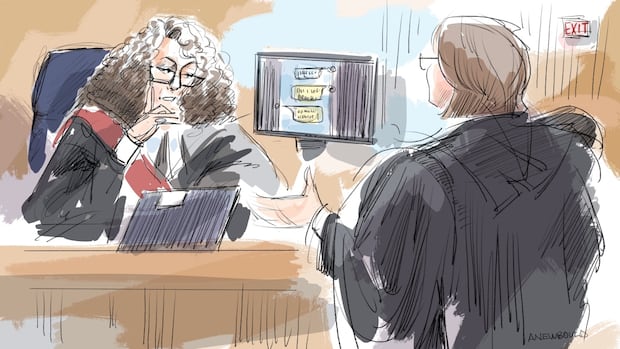The four men on trial for their alleged involvement in a 2018 group sexual assault faced a third day of testimony yesterday, as the woman at the center of the case underwent intense cross-examination about her memories of the night in question.
The case has renewed nationwide conversations about consent in sports culture, particularly as defense attorneys questioned the woman about her alcohol consumption and text messages sent before meeting the players at a London, Ontario bar following a Hockey Canada Foundation gala.
“It’s a troubling pattern we continue to see in sexual assault cases,” says Farrah Khan, manager of Consent Comes First at Toronto Metropolitan University. “The focus shifts to scrutinizing the victim’s behavior rather than examining whether affirmative, ongoing consent was present.”
Court heard that the woman, who cannot be identified due to a publication ban, testified she felt “completely frozen” during parts of the encounter with former NHL player Alex Formenton and ex-junior players Dillon Dubé, Cal Foote and Carter Hart. All four men have pleaded not guilty to sexual assault.
The trial comes six years after the incident and follows a $3.55-million lawsuit the woman filed against Hockey Canada and eight unnamed players that was settled out of court in May 2022. That settlement triggered a national outcry when it became public, leading to parliamentary hearings and major governance changes at Hockey Canada.
Experts say the case highlights persistent issues in how sexual assault trials unfold. Elaine Craig, a Dalhousie University law professor who researches sexual assault law, notes that “despite decades of legal reforms, complainants still face extraordinary scrutiny of their behavior before and after alleged assaults in ways that can perpetuate myths about what constitutes ‘real rape.'”
The woman testified earlier this week that she met some of the players at a bar and went to a hotel room with one of them voluntarily, but did not consent to sexual activity with multiple men. Defense lawyers have suggested the encounter was consensual.
Hockey Canada has implemented new mandatory sexual violence training and a comprehensive code of conduct since 2022. The organization’s independent third-party investigation into the incident remained suspended pending the criminal proceedings.
“Cases like this have ripple effects far beyond the courtroom,” says Lorraine Lafrenière, CEO of the Coaching Association of Canada. “They force us to confront uncomfortable questions about the cultures we create in sports from the grassroots to elite levels.”
The trial has garnered intense public attention, with advocates for sexual assault survivors concerned about potential chilling effects on reporting. Statistics Canada data shows that only about 6% of sexual assaults are reported to police, with even fewer resulting in convictions.
“When high-profile cases become public spectacles, it can reinforce victims’ fears about coming forward,” says Nneka MacGregor, executive director of the Women’s Centre for Social Justice. “Many ask themselves if enduring this level of scrutiny is worth it.”
Court heard that in 2018, London police initially closed their investigation without charges, but the case was reopened in 2022 after media reports about Hockey Canada’s handling of the case sparked public outrage.
The trial is expected to continue for several weeks. Justice Bruce Thomas is presiding over the case, which is being heard by judge alone rather than a jury.
Meanwhile, several professional hockey teams have placed the accused players on leave pending the outcome of the proceedings. The NHL has stated it will wait for the legal process to conclude before determining any potential disciplinary action.
As testimony continues, the case raises broader questions about power dynamics, alcohol, and consent – particularly in environments where young athletes achieve celebrity status at an early age.
“This isn’t just about individual behavior,” says Dr. Michael Kehler, research professor of masculinities studies at the University of Calgary. “It’s about systems that sometimes fail to teach young men about respect, boundaries, and ethical decision-making as thoroughly as they teach technical skills.”
The trial resumes Monday.






